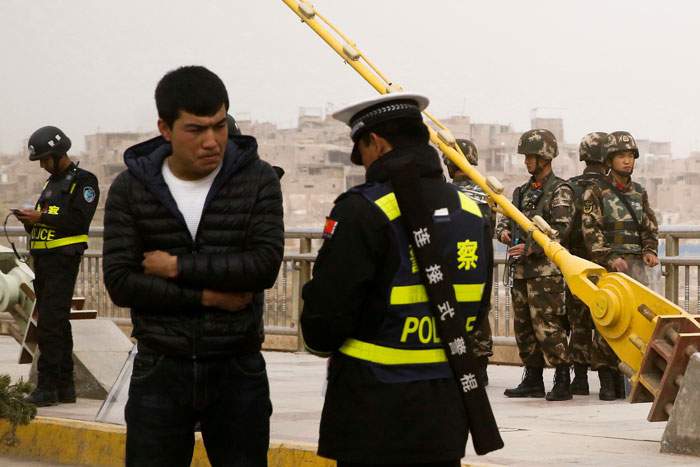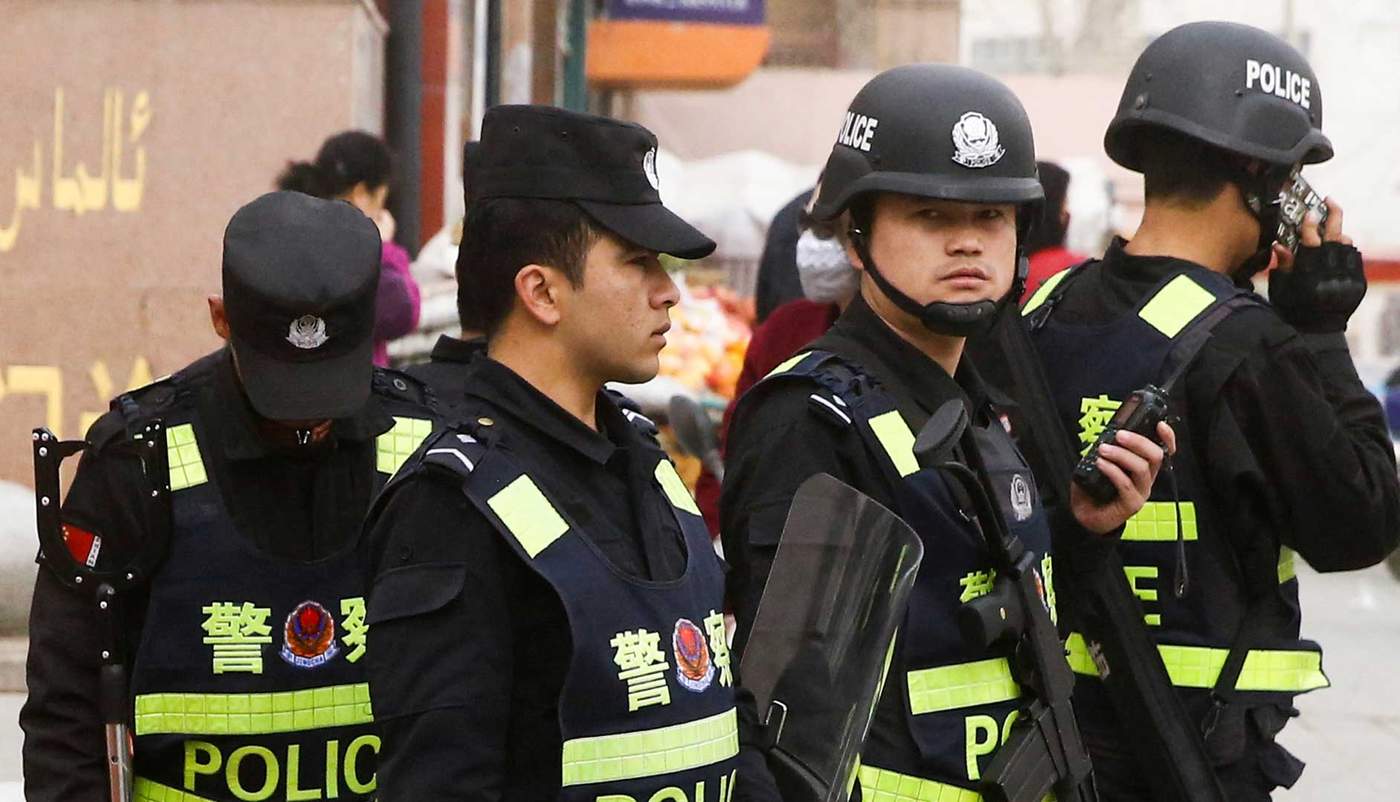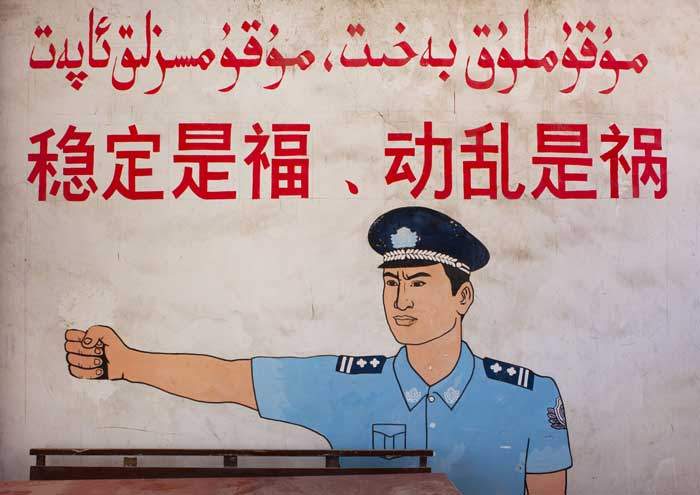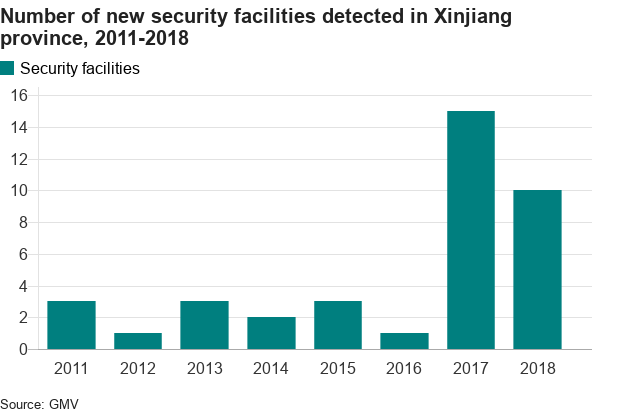Harmony and Loyalty to the Chinese Communist Party
"It's as if the whole population is treated as guilty until proven innocent."
"These internment camps and prisons are not going away and stand as a warning to the population that they better be more loyal to the party."
Sean R. Roberts, anthropologist, George Washington University, Washington
"I'm very worried about her [his imprisoned wife], because there's been no information."
"Everyone is talking about the camps, even at the United Nations, but the prisons are taking in more and more, and they're under even stricter control."
Almas Nizamidin, 27, Uighur, Australia
 |
| A police checkpoint in Kashgar, March 2017 |
"The government thinks they [Uighur professionals, academics, businesspeople] are more dangerous because they have money and knowledge and often have been abroad."
"Families often don't know where their loved ones have disappeared. Then we hear that this person was sentenced, or that one is in prison."
"Almost every family has this experience."
Habibulla Altay, Uighur tea merchant, Switzerland
 |
| The policies appear to mark a fundamental shift in official thinking - separatism is no longer framed as a problem of a few isolated individuals, but as a problem inherent within Uighur culture and Islam in general. BBC |
China wants obedient, faithful-to-the-state populations within its vast empire. Harmony, above all else. Dissent is not permitted, questioning authority is forbidden, quiescent, biddable citizens mean that the Chinese Communist Party need have no concerns that ethnic or religious groups, or groups that have been deprived of their autonomy, freedom and sovereignty when their homelands have been ensnared in China's octopus grip -- like Tibet, or the Turkic people of Xinjiang -- object in any measure to their status.
Xinjiang region's Uighurs have earned the imposition of the Chinese authority's vast surveillance system to keep tabs on their activities and possible plans of protest groups. Relations between the Han Chinese and the Uighurs have been fraught with violence on occasion; distrust and dislike and suspicion have a way of breaking into the open from time to time, frustration and anger spilling over into the public sphere. Leaving the Uighurs intimidated, discriminated against, oppressed.
Their geography has become a giant prison system with actual prison camps named as re-education centers used by the Chinese government to impress upon this stubborn population that their first -- and even better -- only -- loyalty must be to the state, not their religion, not their culture, not their heritage. So northwest China has seen resurgent arrests, trials and prison sentences where millions of Chinese Uighurs are purported to have been incarcerated reflecting the displeasure of the CCP with these citizen-troublemakers.
 |
| A wall poster in Xinjiang reads: “Stability is a blessing, instability is a calamity” |
Uighurs and Kazakhs constitute over half the population of Xinjiang. Xinjiang courts have sentenced 230,000 people to prison between 2017 and 2018 to prison terms of five years or longer. Exiled Uighur activists accuse Chinese officials of ignoring rudimentary legal protection in favour of expediting arrests and incarcerations. All in the name of unity, mind. Police, prosecutors and judges work in collegial tandem for convictions in a drive to eradicate unrest and ultimately convert the Muslim minorities toward loyalty.
Critics of the system insist that arrests are based on exaggerated charges, trials perfunctory, guilty judgements universally applied. Sentenced and imprisoned, abuse and hard labour in overcrowded facilities result. Numbers involved are not released and whether the claims of millions under arrest and imprisoned is accurate is anyone's guess. Xinjiang has 24.5 million residents. Almas Nizamidin who migrated to Australia had been attempting to secure a visa for his wife.
However, 27 year-old Buzainafu Abudourexiti was sentenced in 2017 to seven years in prison, charged and convicted with assembling a crowd, planning to disturb public order. The security situation in Xinjiang erupted from ethnic riots in the regional capital of Urumqi when in 2009 hundreds of people were killed, leading to harsher government policies. Many of the prisoners since sent to prison represented business class people, professionals and academics.

Labels: China, Imprisonment, Security, Uighurs
0 Comments:
Post a Comment
<< Home